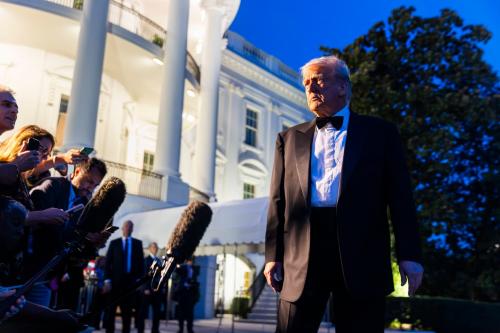Since President Mohammed Mursi, the Muslim Brotherhood candidate, was elected last summer, there have been increasing concerns around the freedom of the press within Egypt. Those concerns suddenly became more pronounced over the last couple of weeks, raising new questions. Those questions go beyond, however, the freedom of the press in Egypt – they also raise other ones about its integrity, as well as its role in a revolutionary transition within this, the Arab world’s most populous country.
There have been concerns for quite some time around freedom of expression and freedom of the press in Egypt. The new constitution approved last year in an extremely tense vote created a new government press regulator, and reinforced the power of the state to close media outlets. Journalists across the state media have privately, and publicly, called attention to articles they believe were pulled due to being critical of the government. The upper house of parliament, the Shura Council, appointed political allies to the heads of media institutions, and in less than 9 months, the numbers of trials over “insulting the president” has exceeded all those that took place during Mubarak’s entire reign.
Too much to handle?
Generally, however, these have been measures that express more the inability and the ineffectual attempts of the new government in restricting the press, rather than actually being able to restrict it. Since the Jan. 25 revolution began, there has been an explosion of expression in Egypt, and while different institutions may try to limit it, it is simply too much for a government to handle. In the midst of that, the English language press in particular has escaped a great deal of attention – the powers that be were, for obvious reasons, more interested in focusing on the much wider read Arabic press. As such, the English language press was able to push the envelope a lot more.
In recent weeks, however, it has become clear that the English language press may not be the same for long. Some of this may be down to the political pressure – some of it down to the realities of print journalism in Egypt. In terms of the former, Hani Shukrallah, the famed editor of Ahram Online (and highly critical of the Muslim Brotherhood) recently wrote that he had been pushed out of his position. Others have reported that across the board, state media is becoming more and more cautious with regards to running stories that are critical of the government – in a way that was not even the case under the military’s reign. Of course, the government’s combined force against the erstwhile editor took a great deal of time and effort – it remains to be seen if they will be able to overcome the institution at large, which remains composed of some of the most determined journalists in Egypt.
Other English language mediums run the risk of being shut down – not because of editorial restrictions, but because of financial considerations. Egypt Independent, one of the more widely read sources for up to date news on Egypt, is in that category – it’s existence threatened more because of the overall financial situation in Egypt, and the limited, niche market that the English language press caters for. That niche market, however, has become particularly influential in terms of informing foreign governments as to the situation in Egypt, as far more international diplomatic staff can access information in English than in Arabic. That in itself has probably accounted for a lot of the increased attention given to it by the MB government’s supporters – which may cause tensions in the future. Again, nevertheless, the spirit of the Egyptian media remains defiant, even against market forces: the team of the newspaper have taken matters into their own hands, and have raised a subscription campaign to revitalize the financial prospects of the paper.
Neutrality
Beyond these legitimate concerns about the future of English language press in Egypt, however, there is a more core, basic issue that has yet to be discussed. For all of the positive sides of the English language press in Egypt, in one regard it is very similar to the Arabic language press – and that is in the area of neutrality. The worst of articles are often tabloid, bereft of original analysis, relying instead on thinly veiled bias. The best, however, are devoid of even an attempt to account for bias. A balanced view, in Egyptian commentary, is rare.
Many do not find this particularly troubling, arguing that in Egypt’s transitional phase, it is not only natural, but vital, that media be an agitation method for change. That media that considers itself to be supportive of the revolution should, indeed, consider itself be activism of another type. Others draw attention to the idea that media, in a successfully functioning pluralistic society, which the revolution calls for, ought to be responsible journalism that seeks to present all sides of view fairly.
It may be, actually, that everyone is right. Recently, a story broke out that a church in Fayoum, a small town not far out of Cairo, had been attacked due sectarian violence. An Egyptian English-language daily checked out the story – and found that actually, that wasn’t the case. After they reported as such, they were vilified – but they were telling the truth. It was simply that the truth was not convenient in terms of the current ‘battle’ of the revolution – the conflict with the MB. But the strength of the revolutionaries, as they continue to say, is not based on might – but on right. What can be right about upholding a false narrative?
MB and state media
After a successful transition, one might hope that all Egyptian state media would be wound up into a BBC-like institution – both in terms of numbers of mediums, as well as in style and approach. Egypt is a far way off from that, however. In the meantime, genuinely pro-revolutionary media probably should find space, somewhere, to be that equivalent of the BBC. A voice that represents all facets of Egyptian society – because no one else will do it. The MB media is not interested; nor is the state media. That, in itself, is actually a very revolutionary move – because it shows, by example, what ought to be the case. If the state can’t – or won’t – do their duty in this regard, pro-revolutionary mediums should take it up instead.
That is not to say that there should not be other types of independent, private voices in the media arena, that are deeply opinionated – on the contrary, at this stage in Egypt’s transition, perhaps most of all, there is a need for continued agitation. That can only happen with such incisive analysis and commentary, which should indeed be as partisan as the authors are. In such endeavors, nonetheless, an emphasis on truth, rather than political success, needs to be first and foremost.
If one can talk about “revolutionary success” when it comes to the media, it probably has two major elements to it. The first is the pre-eminent emphasis on relying only on the most truthful and trustworthy of sources – regardless of who that benefits or not. The second is fairness – something that probably the most revolutionary of writers, journalists and commentators in Egypt ought to seriously consider themselves as honor bound to uphold, at least until there is serious reform in the state media. Activist media is indeed an integral part of the revolution during its transition – and those two elements are, indeed, deeply embedded within the best kind of activist media.
The Brookings Institution is committed to quality, independence, and impact.
We are supported by a diverse array of funders. In line with our values and policies, each Brookings publication represents the sole views of its author(s).



Commentary
Op-edPress Explosion in Egypt Brewing Trouble?
February 23, 2013